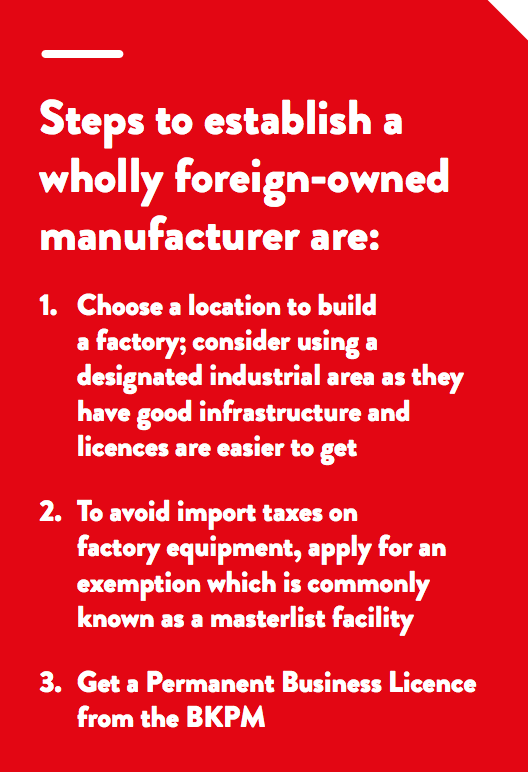Manufacturing in Indonesia
Indonesia recently became the 10th-largest manufacturing nation in the world. It’s large manufacturing sector accounts for almost a quarter of the nation’s total GDP and employs over a fifth of Indonesia’s working age population (around 25 million workers). Put into perspective, Indonesia’s manufacturing sector is now larger than the manufacturing sectors of the United Kingdom, Russian and Mexico.
In 2014, the services sector was the most prominent employer in Indonesia, accounting for 45% of local workers (compared to only a third in 1990). This was followed by the agriculture sector which employs 34% of local workers (down from 56% in 1990) and the industry sector (including manufacturing) which accounts for 21% of local workers (having become more prominent in recent years). Indonesia’s labour pool is estimated at around 120 million people, and is growing annually by approximately 2.4 million. As the economy has progressed beyond its predominantly agricultural base to a mixed composition, more workers – particularly women – are now employed in manufacturing and service-related professional industries.
With it’s rapidly growing middle class and competitive workforce, more foreign investors than ever before are taking advantage of Indonesia’s strong manufacturing sector. However, the sector has significant challenges, including intense international competition, particularly from China, increasing labour costs, high transportation and logistics costs, difficulties getting credit, and varying levels of transparency and clarity in regulations.
Indonesia is an increasingly attractive destination for foreign investment in manufacturing thanks to its cost- effective and abundant labour. If you plan to set up a manufacturing company or manufacture products in Indonesia then there are three potential ways you can do so. Most Australian manufacturers establish in Indonesia as either a partnership/joint venture with an Indonesian party or hire sub-contractors. Both of these options generally involve the Indonesian party already having established factories with equipment and staff. Be sure to perform due diligence on local business partners.
The third option is starting up a wholly foreign-owned (generally a PMA) manufacturer company. However, this can bring more challenges than the other two options due to starting the business from scratch.

In recent years, Indonesia has launched a system of designated special economic zones (SEZ) which offer various administrative incentives such as easier licensing processes, tax concessions and advanced infrastructure to encourage the establishment of businesses and industries. Prioritised industries include manufacturing, maritime, transportation, banking and tourism. Free-trade zones provide business incentives and advantages relating to trade barriers, tariffs, quotas and bureaucratic requirements. Companies manufacturing in the Batam free trade zone are exempt from import duties, luxury tax and value added tax.
Manufacturing companies are restricted in importing finished products for direct sale. The limited finished products permitted to be imported include those that are free samples or complementary products and those used for market testing.
Want to learn more? Explore our other Indonesia information categories or download the Indonesia Country Starter Pack.
